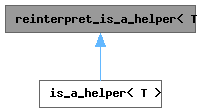reinterpret_is_a_helper< T > Struct Template Reference
#include <is-a.h>
Inheritance diagram for reinterpret_is_a_helper< T >:

Static Public Member Functions | |
| template<typename U> | |
| static T | cast (U *p) |
Detailed Description
template<typename T>
struct reinterpret_is_a_helper< T >
struct reinterpret_is_a_helper< T >
Dynamic testing for abstract is-a relationships. Copyright (C) 2012-2026 Free Software Foundation, Inc. Contributed by Lawrence Crowl. This file is part of GCC. GCC is free software; you can redistribute it and/or modify it under the terms of the GNU General Public License as published by the Free Software Foundation; either version 3, or (at your option) any later version. GCC is distributed in the hope that it will be useful, but WITHOUT ANY WARRANTY; without even the implied warranty of MERCHANTABILITY or FITNESS FOR A PARTICULAR PURPOSE. See the GNU General Public License for more details. You should have received a copy of the GNU General Public License along with GCC; see the file COPYING3. If not see <http://www.gnu.org/licenses/>.
This header generic type query and conversion functions.
USING THE GENERIC TYPE FACILITY
The user functions are:
bool is_a <TYPE> (pointer)
Tests whether the pointer actually points to a more derived TYPE.
Suppose you have a symtab_node *ptr, AKA symtab_node *ptr. You can test
whether it points to a 'derived' cgraph_node as follows.
if (is_a <cgraph_node *> (ptr))
....
TYPE as_a <TYPE> (pointer)
Converts pointer to a TYPE.
You can just assume that it is such a node.
do_something_with (as_a <cgraph_node *> *ptr);
TYPE safe_as_a <TYPE> (pointer)
Like as_a <TYPE> (pointer), but where pointer could be NULL. This
adds a check against NULL where the regular is_a_helper hook for TYPE
assumes non-NULL.
do_something_with (safe_as_a <cgraph_node *> *ptr);
TYPE dyn_cast <TYPE> (pointer)
Converts pointer to TYPE if and only if "is_a <TYPE> pointer". Otherwise,
returns NULL. This function is essentially a checked down cast.
This functions reduce compile time and increase type safety when treating a
generic item as a more specific item.
You can test and obtain a pointer to the 'derived' type in one indivisible
operation.
if (cgraph_node *cptr = dyn_cast <cgraph_node *> (ptr))
....
As an example, the code change is from
if (symtab_function_p (node))
{
struct cgraph_node *cnode = cgraph (node);
....
}
to
if (cgraph_node *cnode = dyn_cast <cgraph_node *> (node))
{
....
}
The necessary conditional test defines a variable that holds a known good
pointer to the specific item and avoids subsequent conversion calls and
the assertion checks that may come with them.
When, the property test is embedded within a larger condition, the
variable declaration gets pulled out of the condition. (This approach
leaves some room for using the variable inappropriately.)
if (symtab_variable_p (node) && varpool (node)->finalized)
varpool_analyze_node (varpool (node));
becomes
varpool_node *vnode = dyn_cast <varpool_node *> (node);
if (vnode && vnode->finalized)
varpool_analyze_node (vnode);
Note that we have converted two sets of assertions in the calls to varpool
into safe and efficient use of a variable.
TYPE safe_dyn_cast <TYPE> (pointer)
Like dyn_cast <TYPE> (pointer), except that it accepts null pointers
and returns null results for them.
If you use these functions and get a 'inline function not defined' or a
'missing symbol' error message for 'is_a_helper<....>::test', it means that
the connection between the types has not been made. See below.
EXTENDING THE GENERIC TYPE FACILITY
Method 1
--------
If DERIVED is derived from BASE, and if BASE contains enough information
to determine whether an object is actually an instance of DERIVED,
then you can make the above routines work for DERIVED by defining
a specialization of is_a_helper such as:
template<>
struct is_a_helper<DERIVED *> : static_is_a_helper<DERIVED *>
{
static inline bool test (const BASE *p) { return ...; }
};
This test function should return true if P is an instanced of DERIVED.
This on its own is enough; the comments below for method 2 do not apply.
Method 2
--------
Alternatively, if two types are connected in ways other than C++
inheritance, each connection between them must be made by defining a
specialization of the template member function 'test' of the template
class 'is_a_helper'. For example,
template <>
template <>
inline bool
is_a_helper <cgraph_node *>::test (symtab_node *p)
{
return p->type == SYMTAB_FUNCTION;
}
If a simple reinterpret_cast between the pointer types is incorrect, then you
must also specialize the template member function 'cast'. Failure to do so
when needed may result in a crash. For example,
template <>
template <>
inline bool
is_a_helper <cgraph_node *>::cast (symtab_node *p)
{
return &p->x_function;
}
A base class that specializations of is_a_helper can use if casting U * to T is simply a reinterpret_cast.
Member Function Documentation
◆ cast()
template<typename T>
template<typename U>
|
inlinestatic |
References T.
Referenced by as_a(), is_a_helper< const T * >::cast(), dyn_cast(), and safe_as_a().
The documentation for this struct was generated from the following file: